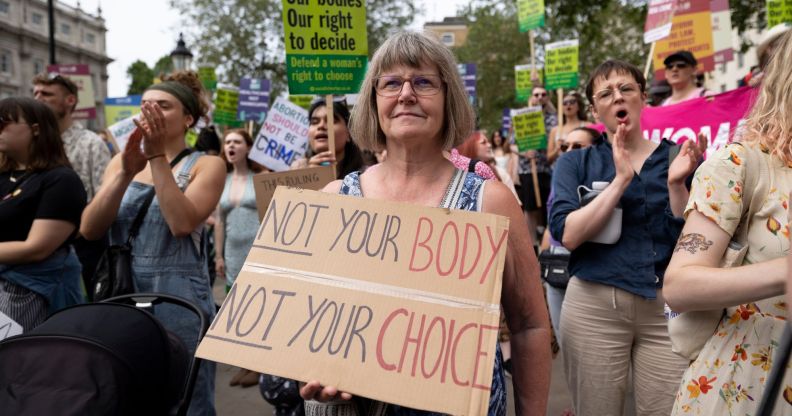James Cleverly to ease restrictions on anti-abortion protesters outside clinics

James Cleverly eases upcoming laws against anti-abortion protesters approaching clinics (Hesther Ng/SOPA Images/LightRocket via Getty Images)
Home secretary James Cleverly has reportedly weakened laws that would restrict the ability of protesters outside abortion clinics to harass people going inside.
Cleverly, who replaced Suella Braverman at the Home Office in November, is believed to have eased upcoming laws to allow anti-abortion protesters to continue to take part in some activities within abortion clinic “safe zones”, including “silent prayer” and speaking to patients, inews reported.
In October 2022, MPs voted in favour of creating of 150-metre-wide “safe access zones” outside clinics to stop anti-abortion protesters harassing patients, including by handing out of leaflets, praying and showing them graphic images.
According to reports published on Tuesday (16 January), however, draft guidance from the Home Office says anti-abortion campaigners will still be allowed inside the buffer zones – and being able to “silently pray” – as long as they are not “influencing” those seeking an abortion.
MPs and abortion organisations have claimed this would still amount to harassment, and that it goes against votes on the original law.
“We are consulting publicly on the non-statutory guidance on abortion clinic Safe Access Zones,” a spokesperson for the Home Office told PinkNews.
“All responses will be considered ahead of the Home Office publishing the final version of the guidance.”
The consultation document, which closes for responses on 22 January, claims that while people inside the buffer zones are banned under the law from “influencing” those seeking a termination, certain activities, such as praying silently, do not amount to “influence”, and should still be allowed.
It claims “prayer within a safe access zone should not automatically be seen as unlawful”, and should only be banned if the behaviour is “intrusive”.
The new guidance appears to go against MPs’ original decision, with previous proposals providing no exemptions for prayer or offering information to those seeking abortions.
In March, the House of Commons specifically voted down calls to allow silent prayer.
Labour MP Rupa Huq, who proposed buffer-zone legislation nationwide after rolling it out in her Ealing Central and Acton constituency, told inews: “It seems totally contrary to all logic that after MPs from all parties voted overwhelmingly to introduce robust legislation to stop women being impeded from exercising their right to use abortion clinics… the statutory draft guidance put out for consultation seeks to undo this.”
Huq added that the draft bill’s “myriad exemptions” for issues such as silently praying, would still make those attending abortion clinics feel “watched, judged and the subject of unwanted attention”.
Meanwhile, Rachael Clarke, the chief of staff at the British Pregnancy Advisory Service, told the news outlet: “We are shocked by the Home Office’s attempt to gut a law which a majority of MPs across all parties in England and Wales voted for.
“The idea that standing outside a clinic for 12 hours a day, watching women enter and leave, handing out leaflets telling women falsely that abortion causes breast cancer and child abuse, standing at the clinic gate every day of the week praying with a collection of blue and pink rosary beads, aren’t designed to influence women would be laughable if it wasn’t so dangerous.
“It is [the Home Office’s] job to put what MPs voted for into power and protect women.”
Buffer zones have been set up outside abortion clinics in Manchester, Birmingham, Bournemouth and London, but these have been created by local councils, rather than at a country-wide level.

